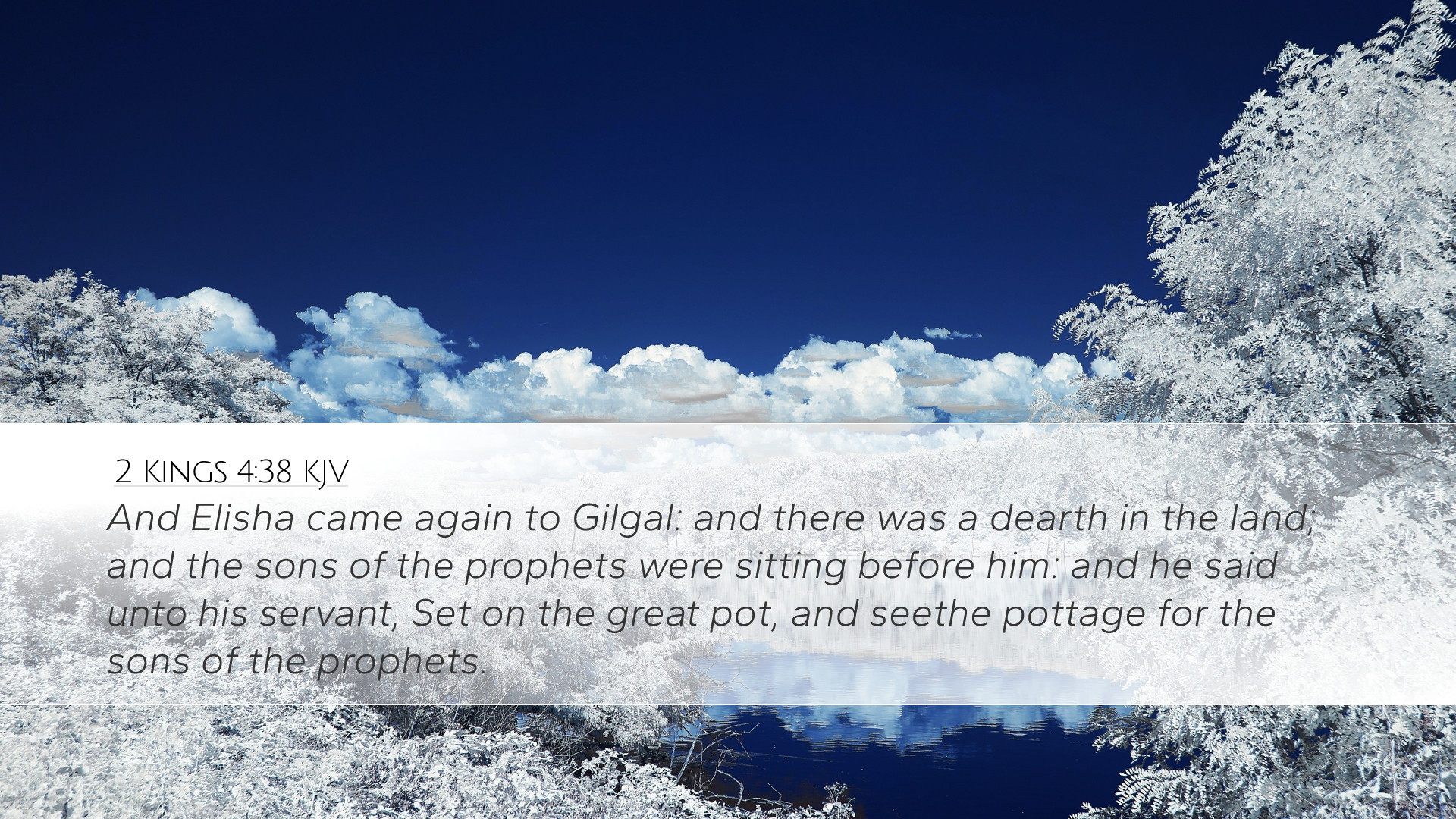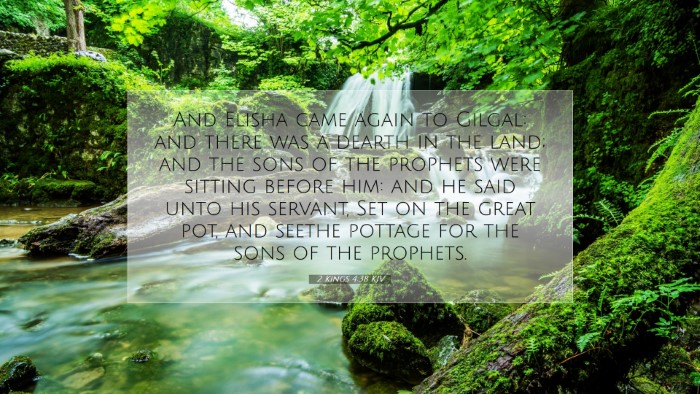Commentary on 2 Kings 4:38
Verse Context: 2 Kings 4:38 states, "And Elisha came again to Gilgal: and there was a dearth in the land; and the sons of the prophets were sitting before him: and he said unto his servant, Set on the great pot, and seethe pottage for the sons of the prophets."
Introduction
This passage introduces us to a significant moment in the ministry of the prophet Elisha, emphasizing themes of faith, reliance on God, and the divine provision in times of need. The 'sons of the prophets' represent a community of prophetic trainees and signal a movement of spiritual renewal in Israel during a period of spiritual darkness. This commentary draws from various public domain sources, offering insights suited for pastors, students, theologians, and biblical scholars.
Exegesis of the Text
Elisha is noted to have returned to Gilgal, a site rich with history concerning Israel's covenant with God. Matthew Henry emphasizes the importance of this location, as it represents both a place of remembrance and a center of prophetic activity. The mention of a 'dearth' illustrates not only a physical famine but also a drought of spiritual vitality.
Spiritual Implications: The 'dearth' serves as a metaphor for spiritual barrenness that often accompanies physical hardship. Just as the land suffers from drought, so too do the hearts of people who have turned away from God.
Elisha's Role: As the designated prophet, Elisha's role is to provide for the community of prophets. He acts with leadership and authority, calling his servant to prepare food for those who are spiritually hungry. This act underscores the necessity of physical sustenance alongside spiritual nourishment.
The Significance of the Great Pot
The 'great pot' mentioned conveys a sense of communal effort and resourcefulness. Adam Clarke points out that the great pot symbolizes the gathering of resources for the collective good, signifying that leaders must ensure the well-being of their followers. The act of cooking together suggests unity and fellowship in the face of adversity.
The Community of Prophets: The group sitting before Elisha demonstrates the importance of community in spiritual formation. In difficult times, communal gatherings provide strength and support, illustrating the biblical principle that where two or three gather in His name, He is among them.
The Dangers of Spiritual Vigilance
As the pot is prepared, Matthew Henry warns of the dangers inherent in spiritual leadership. There is a reminder that even those who seek to serve can fall into error if they are not vigilant. The appearance of 'wild gourds' is significant; it represents the potential for poisonous influences in our lives and ministries.
Lessons on Discernment: This speaks to the necessity of discernment among leaders. Just as the pot was intended for nourishment, leaders must be cautious and seek God's wisdom to avoid poisonous influences that can harm the body of believers.
Divine Intervention in Times of Need
When the poisonous gourds were discovered, the response was immediate. Elisha, representing God's power and provision, instructed them to bring meal to the pot. Clarke notes that this represents a call to trust in God's ability to transform situations that seem dire. By adding the meal, Elisha signified that God will provide for every need—both physically and spiritually.
The Nature of God's Provision: This action illustrates divine intervention, portraying that God not only sees our ailments but has the power to remedy them. In theological education, this scene serves as a reminder that reliance on God’s provision is essential, particularly when confronting our limitations.
Theological Reflections
The passage, while historical, has profound theological implications that resonate throughout the Church today. Spiritual leaders face various challenges, and the dearth signifies that they must continually seek God for guidance and sustenance. Here are some theological reflections:
- Community and Leadership: Leaders are called to foster community, taking care of those entrusted to them.
- Spiritual Discernment: Great care must be taken to ensure that the influences within the community are life-giving.
- God’s Provision: In times of need, whether physical or spiritual, we must trust in God's ability to provide abundantly.
- Reflection of Christ: Elisha's work foreshadows the ministry of Christ, who nourished both body and spirit.
Conclusion
2 Kings 4:38 provides a rich narrative that showcases the dynamics of faith, community, and divine provision. Elisha's interactions with the sons of the prophets remind us of the necessity of spiritual nourishment and the vigilance required in leadership. The events surrounding the 'great pot' illustrate that while we may face challenges, God's provision is ever-present, inviting believers to trust in His goodness. As pastors, students, theologians, and scholars dive deeper into this text, may they find renewed encouragement to lead with discernment and seek divine sustenance in their ministries.


